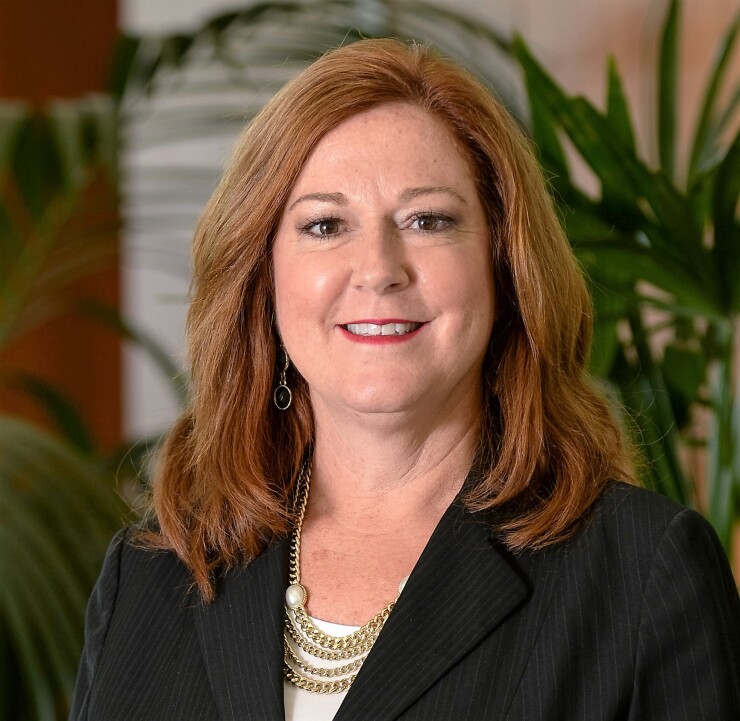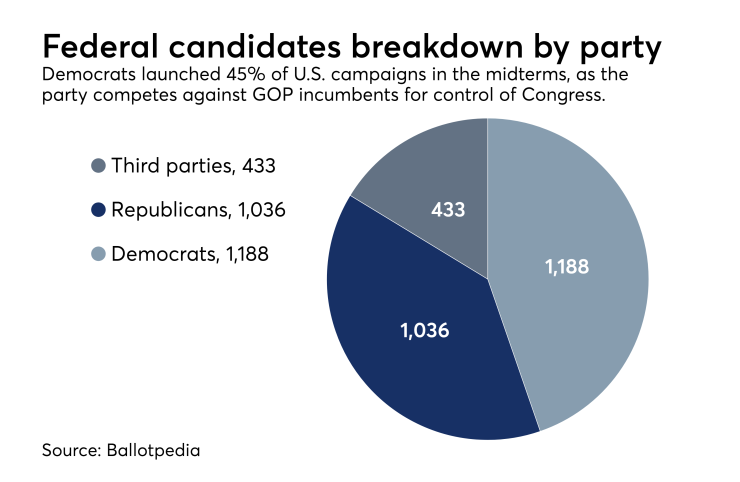Financial advisors are pitching themselves in next week’s midterms to a voter base that's both increasingly open to outsider candidates and concerned about budgets and debt.
Several current and former advisors and industry executives are running for local, state and federal posts. The crop of candidates in the midterms doesn’t represent so much a wave as a longtime trend of civic participation.
The case for advisors holding public office revolves around their intriguing set of skills: budgetary expertise, long-range planning ability and trustworthiness. Campaigning and serving in elected office helps to strengthen advisors’ communication skills and their bonds with the community, say political experts and current and past candidates.
As candidates, advisors can benefit from the public’s interest in political newcomers over longtime insiders, says Riskalyze CEO Aaron Klein, noting President Trump as one such example.
“Financial advisors present a very unique blend of business owner and entrepreneur, along with proven expertise in financial management, so that voters can get the shakeup they want, while keeping government on track,” says Klein, a former 12-year elected trustee of Sierra College in California.
“I would not be surprised,” he adds, “to see more and more financial advisors choose to step into the public circle and put themselves forward for political office.”
-
Several Senate, House and gubernatorial battles are of interest to financial firms. Here is a spotlight on specific contests, with updates as they become available.
November 6 -
Gun safety proposals and the Affordable Care Act can be polarizing topics, but this advisor tweets about them anyway — to much success.
October 24 -
Schwab, Vanguard and LPL explained their approach to campaign donations as the industry and its supporting sectors provided $19 million in PAC contributions.
October 11 -
Amid a polarized climate, one firm is giving some clients what they've asked for.
October 4
Schwab, Vanguard and LPL explained their approach to campaign donations as the industry and its supporting sectors provided $19 million in PAC contributions.
The current slate of wealth management candidates cuts across party lines.
Neal Simon, CEO of Bronfman Rothschild, is
At the local level, advisor Amanda Murphy of Raymond James & Associates, a Democrat and a former Florida lawmaker, is
Advisors have been running for elected office for decades. Pennsylvania-based veteran Republican political consultant Christopher Nicholas recalls a planner running in 1990, his first year working in politics.
They bring a sense of trust, especially among older voters who are more likely to have an advisor, Nicholas says. Of course, that trust won’t translate in office unless advisors have a strong record in their profession, he says.
“In order for the relationship to work, people have to trust their financial advisor,” Nicholas says, noting their financial backgrounds as another plus. “They can talk about the fact that they are more conversant with numbers and figures and budgets than the average candidate.”

The six members of Murphy’s Tampa-based practice, 360 Wealth Management Group of Raymond James, manage $600 million in client assets. Her campaign
“My background and understanding of financial planning, sound investment strategies and how to effectively plan for the future … directly translates into being a successful legislator,” she wrote in an email. “What motivates me is that I see families struggling to make daily ends meet while trying to plan for a rainy day and a long-term retirement.”
Serving in office allows advisors to gain a broader perspective of their client base, according to Murphy and LPL Financial advisor Scott Hollowell. In addition to running Hollowell Financial Group, in Peachtree City, Georgia, he serves on the board of the Fayette County Public Schools.
Hollowell, a Republican, won election to the 20,000-student district’s board in 2015, his second time running. One of his clients encouraged him to run in 2011 and worked as his campaign manager.

Running and holding elected office won’t generate a lot of referrals, but it doesn't hurt an advisor’s business either, he says.
“Being an elected official will definitely force you to work on your patience and listening skills, which I think is always good. Sometimes I think it’s easy for small business owners to end up in a silo,” says Hollowell. “It connects you to the community in a more meaningful way.”
He also sees advisors’ ability to explain complex issues easily as an attribute for their public service, and taking his message door-to-door to voters didn’t pose any difficulties for him after getting his start in the financial services with Edward Jones, Hollowell adds.
Klein’s background assessing risk also came in handy during his time on the elected board of the community college in Northern California, he says. The 12 years included several challenging debates on ways to best approach the budget for Sierra, which has the state’s largest community college district.
“It turns out risk management is kind of important in a variety of fields, not just financial advice,” he says.
“You’ve got to be a clear communicator if you’re going to lead in public service,” Klein continues. “And you’ve got to be a clear communicator if you’re going to lead your clients to the right solutions as a wealth manager.”






